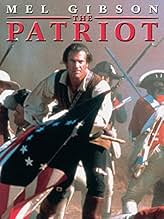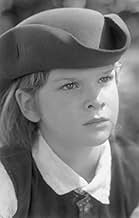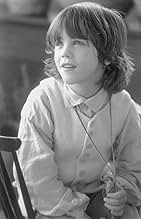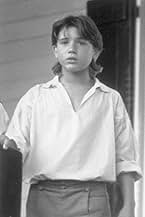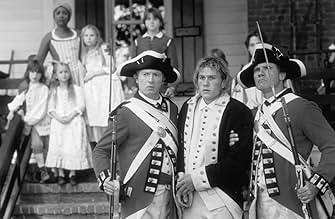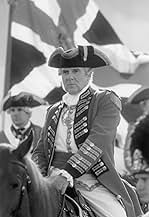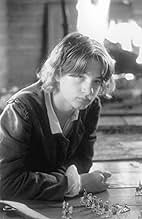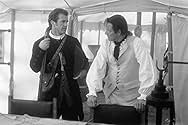शांतिपूर्ण किसान बेंजामिन मार्टिन को अमेरिकी क्रांति के दौरान औपनिवेशिक मिलिशिया का नेतृत्व करने के लिए प्रेरित किया जाता है जब एक दुखद ब्रिटिश अधिकारी अपने बेटे की हत्या कर देता है.शांतिपूर्ण किसान बेंजामिन मार्टिन को अमेरिकी क्रांति के दौरान औपनिवेशिक मिलिशिया का नेतृत्व करने के लिए प्रेरित किया जाता है जब एक दुखद ब्रिटिश अधिकारी अपने बेटे की हत्या कर देता है.शांतिपूर्ण किसान बेंजामिन मार्टिन को अमेरिकी क्रांति के दौरान औपनिवेशिक मिलिशिया का नेतृत्व करने के लिए प्रेरित किया जाता है जब एक दुखद ब्रिटिश अधिकारी अपने बेटे की हत्या कर देता है.
- 3 ऑस्कर के लिए नामांकित
- 9 जीत और कुल 23 नामांकन
फ़ीचर्ड समीक्षाएं
Until the early 2000s, Mel Gibson's name was on the rise and synonymous with the box office. A fact driven by several successes with the public and even critics, such as "Braveheart", which earned him several awards, including the main one from the Academy at that time. Well, this title directed by Roland Emmerich directly evokes Gibson's feature, only changing the dominated people, from the Scottish to the American.
"The Patriot" takes place in 1776 and we begin to follow the story of Benjamin Martin (Mel Gibson), a war veteran, a widower, who fought against France and against the natives of the land, and understands the horrors of a battle. Traumatized, Martin seems to raise his family within universal anti-war values. With a gigantic family to raise, and young children to look after, Benjamin opposes the opening of an armed conflict with the British, for the independence of the nation, precisely to avoid yet another tragedy. And the character's motives are absolutely believable. However, the figure of his eldest son, Gabriel (Heath Ledger), appears as an obstacle to a more peaceful life. Gabriel Martin is a patriot and wants to fight for the nation, going against his father's wishes. And he will. It turns out that in the middle of the conflict he needs to return, injured. On this return, the British surround the city where Benjamin and his family live, and it is there that the British commit barbarities against his family, even killing one of his children. From there, driven by the feeling of revenge, Benjamin abandons pacifism and joins Gabriel in an attempt to build an army strong enough to destroy the British presence in the colony.
As a war film, The Patriot brings an important difference: unlike works such as Saving Private Ryan, Platoon or The Cannons of Navarone, which narrate battles that took place in lands far from the residences of their protagonists, this film shows a bloody dispute that , as Gibson's character observes right at the beginning of the narrative, was fought in the backyards of the Americans themselves - something that allowed their enemies to attack their opponents' families in order to lower their morale (it is curious to see the Yankees suffering the same types of abuses that would come to inflict on the Vietnamese about two hundred years later). The scene in which one of the rebels discovers his wife and child dead, for example, is dramatic and shocking, causing a strong impact on the viewer.
Incidentally, The Patriot is full of scenes like this - and there is nothing sadder than seeing a father handing guns to his children, still children, after instructing them to shoot at the enemy. Unfortunately, this is the reality of war, the most stupid and irrational way to resolve a basically commercial issue (in the end, it's always the money that counts). In any case, Roland Emmerich makes a beautiful historical reconstruction, being well advised by the excellent costumes of Deborah Lynn Scott (already a strong contender for the Oscar) and by the realistic art direction of Barry Chusid. The battle scenes are also strong and intense and - although they pale in comparison to the sequences of "Saving Private Ryan" - they end up shocking the viewer by their brutality.
The film demonstrates what happened in the first act, with the death of the youngest son of Mel Gibson's character. Which is shocking for its realism and its meanness to a child. What follows next is already known. The direction does not abuse violence, but uses strategic moments to use it, as in the great war scenes, in which the characters' heads and legs are cut off, but with some caution so that it does not become just blood and carnage. Brutal in the right measure, the film feeds, for two and a half hours, a powerful climax, which is the moment when Benjamin comes face to face with his son's tormentor, Colonel William Tavington (Jason Isaacs). By the way, Jason Isaacs is insufferable in this film, a worthy executioner.
The script, written by the same Robert Rodat of "Saving Private Ryan", is interesting and well structured, in addition to offering several moments that clearly work as comic relief - something practically non-existent in Spielberg's masterpiece. With that, Emmerich creates a film that, despite being "easier" to watch, causes less impact and has its drama diluted by the jokes. A good example resides in the scene in which Martin negotiates a prisoner exchange with General Cornwallis: amusing, the sequence makes the public relax momentarily. On the other hand, the naivety attributed to Cornwallis makes us take him less seriously, reducing the threat posed by his impeccable war strategies (besides, it's hard to believe that an experienced military man like him would accept Martin's conditions without even sending a messenger to ascertain the conditions of the officer's held hostage by the rebels). Another negative aspect of The Patriot can be found in director Roland Emmerich's constant attempts to manipulate the viewer's emotions in a Manichaean and unjustified way (proof of his lack of skill in the dramatic field): the sequence in which young Anne makes a passionate speech (but contrived) in a Church becomes embarrassing, clearly bearing the label of a "Hollywood moment": the music rises, the characters stand up one by one and everyone looks at each other with emotion. The result is ineffective and falsely ringing.
However, the big problem with Rodat's script is the villain played by Jason Isaacs, a certain Captain William Tavington: stereotyped and poorly constructed, the character is the personification of the "British evil" portrayed by Emmerich. Sadistic and arrogant, he takes pleasure in coldly killing his opponents and their families. To top it off, he ends up taking on some typical characteristics of Hollywood bandits, including indestructibility - only the hero will have the power to defeat him, of course. Unfortunately, by summarizing the American Revolution to the figure of a villain, the script loses its main focus: instead of following the development of a war for the independence of a nation, we are led to summarize our expectations of the dispute between two men, who end up personifying the "good" and "bad" sides of the dispute. Thus, when the two finally confront each other, The Patriot loses momentum and concludes with a rushed narrative about the outcome of the war.
Another curious aspect of Robert Rodat's screenplay is the neglect of the issue of slavery: the fact is that several important members of the American Revolution (including the man on whom Gibson's character was based) owned slaves, something that was completely ignored by the film (the only slave in the story serves only as an excuse for Emmerich to show how his militia colleagues come to respect his bravery). It would have been much more interesting if O Patriota addressed this curious paradox: the same men who fought for the nation's freedom denied this right to their slaves. Certainly, the film would only benefit from this new approach, which could perfectly replace any scene related to the love affair between Gabriel and Anne (Lisa Brenner) or Benjamin and Charlotte (Joely Richardson).
Despite everything, this new work by Roland Emmerich is quite effective, even if it forces us to swallow the exaggerated American patriotism (but what could we expect with this title?). In any case, I regret to see that the film could have taken even more ambitious flights, being able to repeat the feat of works like "Glory" and "Platoon", which definitely serve as excellent studies on the insanity of war and on the very attraction that Americans feel for everything involving gunfire and battlefields. If the plot is not innovative, it is very well filmed. Directed by Roland Emmerich (Godzilla and Independence Day), with photography by Caleb Deschanel (Anna and the King) and soundtrack by master John Williams (Star Wars, Superman, Indiana Jones).
The war scenes, despite the flying legs and heads, can't match the opening half hour of Private Ryan, both by the same screenwriter, Robert Rodat, and the hand-to-hand battles aren't as good as those that Ridley Scott either. Filmed with Russell Crowe in The Gladiator, but the film manages to excite, despite the excess of patriotism, as the title itself already shows. Mel Gibson's performance undeniably guarantees the film's heroic vibe, acting now with gallantry, now with violence. "The Patriot" is yet another epic that reaffirms all of its genre characteristics applied to Hollywood's vision of the history of conflict between nations, but which, on the other hand, delivers everything a war film needs.
"The Patriot" takes place in 1776 and we begin to follow the story of Benjamin Martin (Mel Gibson), a war veteran, a widower, who fought against France and against the natives of the land, and understands the horrors of a battle. Traumatized, Martin seems to raise his family within universal anti-war values. With a gigantic family to raise, and young children to look after, Benjamin opposes the opening of an armed conflict with the British, for the independence of the nation, precisely to avoid yet another tragedy. And the character's motives are absolutely believable. However, the figure of his eldest son, Gabriel (Heath Ledger), appears as an obstacle to a more peaceful life. Gabriel Martin is a patriot and wants to fight for the nation, going against his father's wishes. And he will. It turns out that in the middle of the conflict he needs to return, injured. On this return, the British surround the city where Benjamin and his family live, and it is there that the British commit barbarities against his family, even killing one of his children. From there, driven by the feeling of revenge, Benjamin abandons pacifism and joins Gabriel in an attempt to build an army strong enough to destroy the British presence in the colony.
As a war film, The Patriot brings an important difference: unlike works such as Saving Private Ryan, Platoon or The Cannons of Navarone, which narrate battles that took place in lands far from the residences of their protagonists, this film shows a bloody dispute that , as Gibson's character observes right at the beginning of the narrative, was fought in the backyards of the Americans themselves - something that allowed their enemies to attack their opponents' families in order to lower their morale (it is curious to see the Yankees suffering the same types of abuses that would come to inflict on the Vietnamese about two hundred years later). The scene in which one of the rebels discovers his wife and child dead, for example, is dramatic and shocking, causing a strong impact on the viewer.
Incidentally, The Patriot is full of scenes like this - and there is nothing sadder than seeing a father handing guns to his children, still children, after instructing them to shoot at the enemy. Unfortunately, this is the reality of war, the most stupid and irrational way to resolve a basically commercial issue (in the end, it's always the money that counts). In any case, Roland Emmerich makes a beautiful historical reconstruction, being well advised by the excellent costumes of Deborah Lynn Scott (already a strong contender for the Oscar) and by the realistic art direction of Barry Chusid. The battle scenes are also strong and intense and - although they pale in comparison to the sequences of "Saving Private Ryan" - they end up shocking the viewer by their brutality.
The film demonstrates what happened in the first act, with the death of the youngest son of Mel Gibson's character. Which is shocking for its realism and its meanness to a child. What follows next is already known. The direction does not abuse violence, but uses strategic moments to use it, as in the great war scenes, in which the characters' heads and legs are cut off, but with some caution so that it does not become just blood and carnage. Brutal in the right measure, the film feeds, for two and a half hours, a powerful climax, which is the moment when Benjamin comes face to face with his son's tormentor, Colonel William Tavington (Jason Isaacs). By the way, Jason Isaacs is insufferable in this film, a worthy executioner.
The script, written by the same Robert Rodat of "Saving Private Ryan", is interesting and well structured, in addition to offering several moments that clearly work as comic relief - something practically non-existent in Spielberg's masterpiece. With that, Emmerich creates a film that, despite being "easier" to watch, causes less impact and has its drama diluted by the jokes. A good example resides in the scene in which Martin negotiates a prisoner exchange with General Cornwallis: amusing, the sequence makes the public relax momentarily. On the other hand, the naivety attributed to Cornwallis makes us take him less seriously, reducing the threat posed by his impeccable war strategies (besides, it's hard to believe that an experienced military man like him would accept Martin's conditions without even sending a messenger to ascertain the conditions of the officer's held hostage by the rebels). Another negative aspect of The Patriot can be found in director Roland Emmerich's constant attempts to manipulate the viewer's emotions in a Manichaean and unjustified way (proof of his lack of skill in the dramatic field): the sequence in which young Anne makes a passionate speech (but contrived) in a Church becomes embarrassing, clearly bearing the label of a "Hollywood moment": the music rises, the characters stand up one by one and everyone looks at each other with emotion. The result is ineffective and falsely ringing.
However, the big problem with Rodat's script is the villain played by Jason Isaacs, a certain Captain William Tavington: stereotyped and poorly constructed, the character is the personification of the "British evil" portrayed by Emmerich. Sadistic and arrogant, he takes pleasure in coldly killing his opponents and their families. To top it off, he ends up taking on some typical characteristics of Hollywood bandits, including indestructibility - only the hero will have the power to defeat him, of course. Unfortunately, by summarizing the American Revolution to the figure of a villain, the script loses its main focus: instead of following the development of a war for the independence of a nation, we are led to summarize our expectations of the dispute between two men, who end up personifying the "good" and "bad" sides of the dispute. Thus, when the two finally confront each other, The Patriot loses momentum and concludes with a rushed narrative about the outcome of the war.
Another curious aspect of Robert Rodat's screenplay is the neglect of the issue of slavery: the fact is that several important members of the American Revolution (including the man on whom Gibson's character was based) owned slaves, something that was completely ignored by the film (the only slave in the story serves only as an excuse for Emmerich to show how his militia colleagues come to respect his bravery). It would have been much more interesting if O Patriota addressed this curious paradox: the same men who fought for the nation's freedom denied this right to their slaves. Certainly, the film would only benefit from this new approach, which could perfectly replace any scene related to the love affair between Gabriel and Anne (Lisa Brenner) or Benjamin and Charlotte (Joely Richardson).
Despite everything, this new work by Roland Emmerich is quite effective, even if it forces us to swallow the exaggerated American patriotism (but what could we expect with this title?). In any case, I regret to see that the film could have taken even more ambitious flights, being able to repeat the feat of works like "Glory" and "Platoon", which definitely serve as excellent studies on the insanity of war and on the very attraction that Americans feel for everything involving gunfire and battlefields. If the plot is not innovative, it is very well filmed. Directed by Roland Emmerich (Godzilla and Independence Day), with photography by Caleb Deschanel (Anna and the King) and soundtrack by master John Williams (Star Wars, Superman, Indiana Jones).
The war scenes, despite the flying legs and heads, can't match the opening half hour of Private Ryan, both by the same screenwriter, Robert Rodat, and the hand-to-hand battles aren't as good as those that Ridley Scott either. Filmed with Russell Crowe in The Gladiator, but the film manages to excite, despite the excess of patriotism, as the title itself already shows. Mel Gibson's performance undeniably guarantees the film's heroic vibe, acting now with gallantry, now with violence. "The Patriot" is yet another epic that reaffirms all of its genre characteristics applied to Hollywood's vision of the history of conflict between nations, but which, on the other hand, delivers everything a war film needs.
Just watched this movie for about the 20th time (I have it on TiVo) and for the life of me I cannot find the disdain many who have written here have commented on. Last I heard, this was FICTION - NOT a documentary; Ken Burns did not produce not write nor direct nor narrate this piece - Roland Emmerich, a man known for action FICTION did. Yes the depiction of the Revolutionary War was NOT 100% accurate but was never intended to be; just a drama set against the background of a war and it was refreshing to see the war in the background, whereupon American blood is spilled on American soil, was the Revolutionary War and not another Civil War piece; indeed, the Civil War has been played so many times in films over the past quarter century it was just refreshing to see a different war....
Being somewhat of a military historian I will say that the depiction of soldiers going musket to musket in the open field was indeed accurate; many may find it interesting to know that according to the gentlemanly practices of King George's army, both sides would also recess for tea at noon every day and resume the fighting afterwards - guerrilla warfare was not popular during the day which is why Gibson's militia unit was so overtly successful early on. That being said, the comments about the accuracy with the muskets are fairly accurate but I will say that I only see straight barrel musket rifles - none of the bell shape tipped muskets; the longer you keep a projectile on a straight course the more accuracy at longer ranges despite the lack of rifling grooves in the barrels (I spent time on Rifle Teams for 5 years). The prime inaccuracy I noted was when Tavington shot the rider (running away on horseback) in the back with a musket pistol at probably 40 yards or more - so unlikely, it tarnished the whole scene.
My favorite person - Billings; Leon Rippey's cynical, almost giggly snickering laugh completely stole the every scene where it was used and he is a long term favorite actor of mine; Jason Isaacs absolutely best screen villain of this movie (and perhaps in top 10 screen villains of all time).
I guess it boils down to "different strokes for different folks" we all have our opinions on this and I've aired mine.
Being somewhat of a military historian I will say that the depiction of soldiers going musket to musket in the open field was indeed accurate; many may find it interesting to know that according to the gentlemanly practices of King George's army, both sides would also recess for tea at noon every day and resume the fighting afterwards - guerrilla warfare was not popular during the day which is why Gibson's militia unit was so overtly successful early on. That being said, the comments about the accuracy with the muskets are fairly accurate but I will say that I only see straight barrel musket rifles - none of the bell shape tipped muskets; the longer you keep a projectile on a straight course the more accuracy at longer ranges despite the lack of rifling grooves in the barrels (I spent time on Rifle Teams for 5 years). The prime inaccuracy I noted was when Tavington shot the rider (running away on horseback) in the back with a musket pistol at probably 40 yards or more - so unlikely, it tarnished the whole scene.
My favorite person - Billings; Leon Rippey's cynical, almost giggly snickering laugh completely stole the every scene where it was used and he is a long term favorite actor of mine; Jason Isaacs absolutely best screen villain of this movie (and perhaps in top 10 screen villains of all time).
I guess it boils down to "different strokes for different folks" we all have our opinions on this and I've aired mine.
10amierob
I was hesitant to see this movie due to the violence I had heard about. Yes, the movie is violent. But it is also fantastic.
I love Mel Gibson as a family man. He's always a great hero, but he displayed a warm, compassionate side too. His scene crying over his son will break your heart.
I cannot recommend this film enough. My only regret is that a PG version is not also put out, so that younger viewers can also see it.
I love Mel Gibson as a family man. He's always a great hero, but he displayed a warm, compassionate side too. His scene crying over his son will break your heart.
I cannot recommend this film enough. My only regret is that a PG version is not also put out, so that younger viewers can also see it.
I'm very surprised at the lower ratings here. This is a successful example of a movie which balances having fictional characters/situations take place in a historical setting while still maintaining some accuracy. Aside from that, the acting is solid and the effects and quality for a movie made in 2000 are top notch.
10karier13
I have been a Mel Gibson fan since his very good Mad Max and his horrible Summer City. I loved this movie and it is in my top ten favorites of all time. Mel is very believable as Benjamin Martin who fights only after he looses one son to death and one son to the army. Heath Ledger plays Gabriel Martin who goes to fight for his country despite his father's protests. I know that not all of the facts are historically correct but this is a movie and did not claim to be a history lesson. The period is portrayed very well and the battle scenes are so well done that you almost feel you are there. This movie is very graphic in the battles and if you do not like the sight of blood and other realistic battle scenes then this might not be the movie for you. I watched the entire movie and did not realize the length. I was so engrossed in the plots.
क्या आपको पता है
- ट्रिवियाHeath Ledger didn't work for a year because he only got offers for teen heartthrob roles. He was about to quit acting, and return to Australia, when he was cast in the film.
- गूफ़George Washington's proclamation regarding the freeing of slaves who give one year of service is incorrectly interpreted. The historical offer applied to slaves who enlisted in the Continental regulars or served in regular state forces which served with Continental armies. It did not apply to units such as Benjamin Martin's local militia, which solely were under state control.
- भाव
Colonel William Tavington: Kill me before the war is over, will you? It appears that you are not the better man.
Benjamin Martin: You're right. My sons were better men.
- इसके अलावा अन्य वर्जनIn the extended edition, Benjamin Martin's youngest children get their first taste of the horrors of war prior to Thomas's death. This comes just before the evening when Gabriel stumbles home after being wounded in a nearby battle. Something (the viewer is unaware) catches the attention of the Martin children and they stride over to a nearby creek/river to investigate. What they discover are the bodies of several soldiers floating downstream. Martin then comes over and ushers the children back into the house.
- साउंडट्रैकBoney
Traditional
Performed by Marquetta L. Goodwine and the Gullah Cunneckshun
टॉप पसंद
रेटिंग देने के लिए साइन-इन करें और वैयक्तिकृत सुझावों के लिए वॉचलिस्ट करें
विवरण
- रिलीज़ की तारीख़
- कंट्री ऑफ़ ओरिजिन
- आधिकारिक साइटें
- भाषाएं
- इस रूप में भी जाना जाता है
- योद्धा
- फ़िल्माने की जगहें
- Rock Hill, साउथ कैरोलिना, यूएसए(Revolutionary War Re-enactment battles)
- उत्पादन कंपनियां
- IMDbPro पर और कंपनी क्रेडिट देखें
बॉक्स ऑफ़िस
- बजट
- $11,00,00,000(अनुमानित)
- US और कनाडा में सकल
- $11,33,30,342
- US और कनाडा में पहले सप्ताह में कुल कमाई
- $2,24,13,710
- 2 जुल॰ 2000
- दुनिया भर में सकल
- $21,52,94,342
- चलने की अवधि
- 2 घं 45 मि(165 min)
- रंग
- ध्वनि मिश्रण
- पक्ष अनुपात
- 2.39 : 1
इस पेज में योगदान दें
किसी बदलाव का सुझाव दें या अनुपलब्ध कॉन्टेंट जोड़ें




